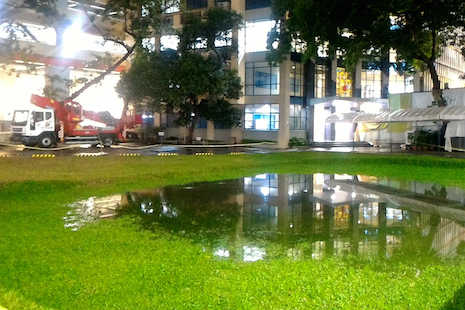
The 'Laudato si' Lake' of Ateneo de Davao University. (Photo by Jef Tupas)
Something "magical" is happening inside the Ateneo de Davao University campus, a Jesuit institution in the southern Philippines.
A patch of green nestled between towering buildings has been attracting dragonflies after every downpour. When the space is dry, students crowd around the intimate and friendly area to read or simply relax.
It is called by many names — Sunken Garden, Laudato si' Park, Laudatu si' Lake, and Magical Garden.
Jim Palma, an advocate of sustainable urban drainage system, said there is nothing magical about the space, only "magical responses."
Palma, who teaches architecture at the university and who designed and developed the area, said it was magical the way the space functions and responds to weather.
"When wet, it transforms into a very calm and reflective pond or lake," he told ucanews.com. "One can enjoy the reflection of the buildings on the water," said Palma, adding that the space is a good area for meditation.
"You can see dragonflies visiting the garden when there is water," he said. "Dragonflies in the urban setting are rare."
It took a little while for students to appreciate the beauty of the garden.
"They would just sit on a bench and play with their gadgets," Palma said. "It is because of their disconnection with nature."
"Living in an urban area desensitizes people to the joys of being exposed to nature," Palma said, adding that cities should invest more on public spaces and nature spaces.
The construction inside the Jesuit university in Davao City was a response to Pope Francis’ encyclical on the environment, "Laudato si'."
Jesuit Father Joel Tabora, the university president, wanted to transform the empty space into something that can mitigate the problem of flooding within and around the campus.
Father Tabora said Laudato si' became an opportunity for everyone to renew their commitment to the advocacy of protecting the environment.
As a response, the Ateneo community resolved to establish a "greener campus."
Jeremy Eliab, assistant to the president, said the garden was intended to be an example that public parks can be designed to mitigate the effects of climate change.
A "change in paradigm" for urban development and construction is possible, Eliab said.
The construction of the garden started in July and was finished in September. It cost slightly more than US$2,500.
The garden was designed to capture rain and floodwater. With an enhanced drainage at the center, the garden captures as much as 230,000 liters of water. Its main feature is the layering of sand and gravel that helps to catch water down to the water table.
"It was designed so that water can infiltrate the ground in 24 to 48 hours," Palma explained.
When the downpour is beyond the capacity of the garden, the design allows water to be pumped out from the center.
The garden has a planted seat wall where students hold activities. The wall facilitates the flow of water to the bed of the garden and functions as a filter.
The sunken bed of the garden is designed to be a bio-retention basin where water is captured and filtered by the grasses.
Surrounding the garden are newly planted Molave trees that have become the school’s way of "celebrating native tree species."
Environmentalist Mary Ann Fuerte-Bolo said the "Laudato si' Lake" of Ateneo can be replicated by other communities.
"This project is proof that we can minimize the impact of the problem of flooding," said Fuertes-Bolo, executive director of Interface Development Interventions, Inc.
Palma hopes that the project will inspire others to create landscapes that are beautiful but also have "environmental and social responsibility."


